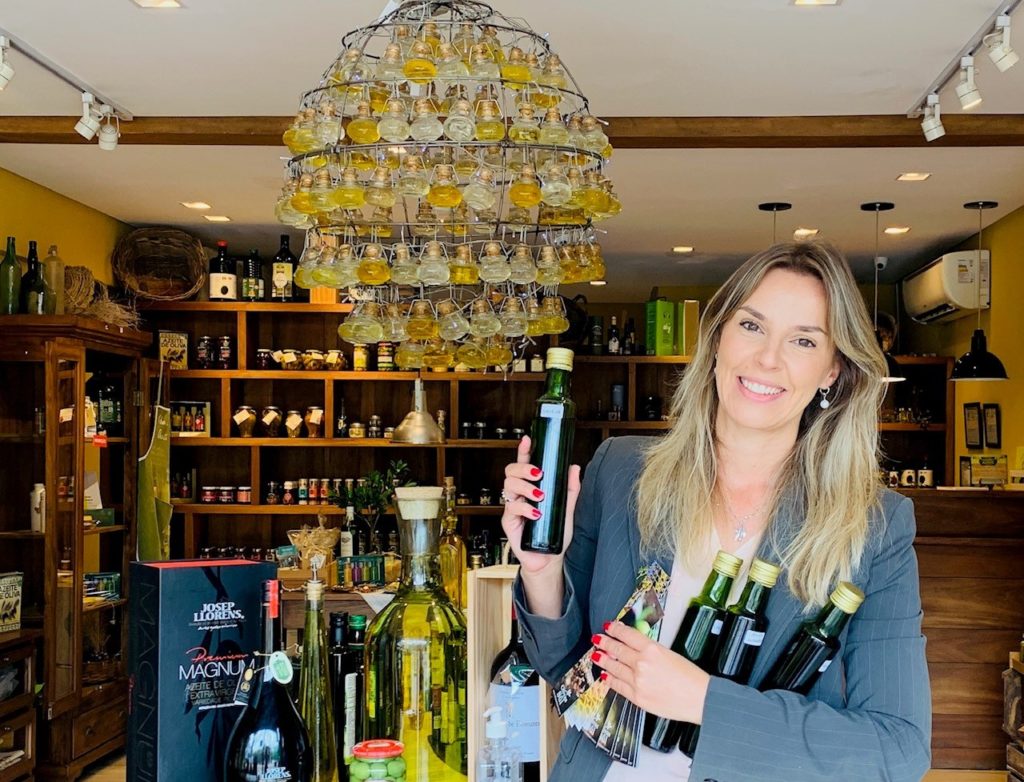São Paulo – In the highlands of the state of Rio Grande do Sul, Empório do Azeite sells labels from 11 different countries. Among the origins of oils sold by the company are Lebanese and Tunisian brands. With a brick-and-mortar point of sale in Gramado and an online store, the company has built nationwide reach over more than six years.
At the head of all the work are partners Chania Chagas (pictured above) and Rafael Arruda. Empório’s co-owner Chagas, a sommelière and olive oil consultant gave interview to ANBA. The Brazilian started to explore the sector in 2013 when she opened a boutique with her father. “We thought about olive oil because [Gramado] is a tourist spot, and it was a market that was not yet developed in Brazil. There were very few national producers and importers,” she revealed.

She, who had always worked in finance, learned about the possibilities of the world of olive oil on a trip to Uruguay. “We took a really nice tour, with tastings. I had never thought of tasting olive oil. Later I took courses, the first at Senac in Rio de Janeiro. Afterward, I went to Portugal and Spain and took a sommelier course in Uruguay,” she said.
Next, the Brazilian obtained a scholarship from the International Olive Council (IOC) to study at the University of Jaén in Spain.
Reference in quality
Today, Chagas also gives consultancy and courses and creates brands for other companies. “Our differential is the quality and range of products. We started to narrow down the products we would like to have in store. Nowadays, we have many offerings of olive oil. I have seen scary things on the market, but other surprisingly good ones; this selection is crucial,” she highlighted.

In her years of experience, she has seen how Brazilian consumers have changed their perspective. “There has never been much talk about olive oil as in 2022. Of course, some myths still exist, such as looking only at acidity, which is a parameter but has nothing to do with flavor or aroma; still, it is very rooted in consumer choice,” she pointed out.
Arab roots
In this range of options, the Brazilian sees possibilities beyond European and South American products. “When I took the course in Spain, I had classmates from Tunisia, and that became more present in my life. Soon after, we tasted many Arab oils. It was fascinating to notice the terroir differences. They are olive oils with different functions and outstanding ones,” pointed out the specialist.
The store currently has three brands from Tunisia with five different labels and four from Lebanon with five distinct oils. Relationships with Arab suppliers have been going on for about four years.

For her, the importance of these nations for the sector also includes crops. “The Chetoui olive, for instance, is an olive tree from Tunisia with a high polyphenols content. It is a very interesting variety,” she said.
In terms of oil extraction techniques, some traditions remain in the region. “In the Arab world, the sisal press is still widely used for extraction, giving the product characteristics of its own. And in Tunisia and other Arab countries, the riper olives are harvested, unlike other markets where nowadays the olives are harvested green,” explained Chagas.
The Brazilian woman points to a promising future for the Tunisians through differentials like these. “Tunisia is a country to keep an eye on because it already stands out for its production. I’ve read they seek to overtake Spain. And Tunisian oils won awards like the Mario Solinas Quality by the IOC. Tunisian olive oil has it all,” she remarked.
Judging olive oils in Dubai
In 2021, the Brazilian was invited to judge in a special oils contest in Dubai. “When we got there, they had over 400 olive oils from all over the world. We were six judges on site and others remotely. We tasted olive oils from different places, including Arab countries and Brazil,” she recounted.

The contest organizers have already called the Brazilian back and anticipate new events, such as a show and even a store with the world’s best olive oils in Dubai.
Meanwhile, Chagas continues with one of the missions of Empório do Azeite: Spreading content about quality olive oils. For this, the company uses social networks and the olive oil subscription club, accompanied by a bimonthly magazine.
Another way to share knowledge is with courses, such as olive oil sommelier, which she has already taken to Porto Alegre once and intends to hold again. In addition to events in Brazilian cities, she soon expects to go to Spain precisely to present Brazilian olive oils to the world. “The plans are to continue bringing up the image of the best olive oils from Brazil,” said Chagas.
Translated by Elúsio Brasileiro




